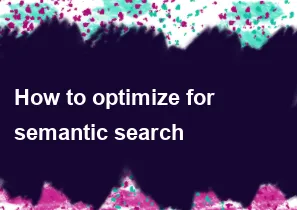How to optimize for semantic search

Optimizing for semantic search involves ensuring that your content aligns well with the way search engines understand the context and intent of user queries. Semantic search goes beyond simple keyword matching and focuses on understanding the meaning behind the words. Here are some strategies to optimize for semantic search:
Create High-Quality Content:
- Develop content that is relevant, informative, and provides value to users.
- Use natural language and answer user queries comprehensively.
Focus on User Intent:
- Understand the intent behind user queries and create content that directly addresses those intents.
- Use long-tail keywords and phrases that reflect the specific questions or needs of your target audience.
Structured Data Markup:
- Implement structured data markup (Schema.org) to provide context to search engines about the content on your page.
- Structured data helps search engines better understand the relationships between different elements on your page.
Optimize for Conversational Queries:
- Anticipate and optimize for conversational queries, as more users are using voice search.
- Consider how people naturally speak and formulate your content accordingly.
Natural Language Processing (NLP):
- Leverage natural language processing in your content creation. This involves writing in a way that mirrors how people speak and ask questions.
- Use tools like Google's NLP API to gain insights into the sentiment and entities within your content.
Entity-Based SEO:
- Focus on entities (specific people, places, and things) rather than just keywords.
- Connect entities in your content to provide a clearer context to search engines.
Semantic Keyword Research:
- Use tools that help identify related and semantically relevant keywords.
- Look for keyword clusters that are related to your main topic.
Mobile Optimization:
- Optimize your content for mobile devices, as a significant portion of searches now comes from mobile users.
Improve Page Load Speed:
- Faster-loading pages improve user experience and are favored by search engines.
Engage in Social Media:
- Social signals can contribute to your site's authority and relevance. Share your content on social media platforms to increase visibility.
Local SEO:
- Optimize for local search by including location-specific information in your content.
Regularly Update Content:
- Keep your content up-to-date to maintain its relevance over time.
Diversify Content Types:
- Include various types of content like images, videos, and infographics to provide a richer experience for users.
Remember that optimizing for semantic search is an ongoing process. Keep abreast of updates to search engine algorithms and continuously refine your approach based on user behavior and technological advancements.
-
Popular Post
- How to optimize for Google's About This Result feature for local businesses
- How to implement multi-language support in an Express.js application
- How to handle and optimize for changes in mobile search behavior
- How to handle CORS in a Node.js application
- How to use Vue.js with a UI framework (e.g., Vuetify, Element UI)
- How to configure Laravel Telescope for monitoring and profiling API requests
- How to create a command-line tool using the Commander.js library in Node.js
- How to implement code splitting in a React.js application
- How to use the AWS SDK for Node.js to interact with various AWS services
- How to use the Node.js Stream API for efficient data processing
- How to implement a cookie parser middleware in Node.js
- How to implement WebSockets for real-time communication in React
-
Latest Post
- How to implement a dynamic form with dynamic field styling based on user input in Next.js
- How to create a custom hook for handling user interactions with the browser's device motion in Next.js
- How to create a custom hook for handling user interactions with the browser's battery status in Next.js
- How to implement a dynamic form with dynamic field visibility based on user input in Next.js
- How to implement a dynamic form with real-time collaboration features in Next.js
- How to create a custom hook for handling user interactions with the browser's media devices in Next.js
- How to use the useSWRInfinite hook for paginating data with a custom loading indicator in Next.js
- How to create a custom hook for handling user interactions with the browser's network status in Next.js
- How to create a custom hook for handling user interactions with the browser's location in Next.js
- How to implement a dynamic form with multi-language support in Next.js
- How to create a custom hook for handling user interactions with the browser's ambient light sensor in Next.js
- How to use the useHover hook for creating interactive image zoom effects in Next.js